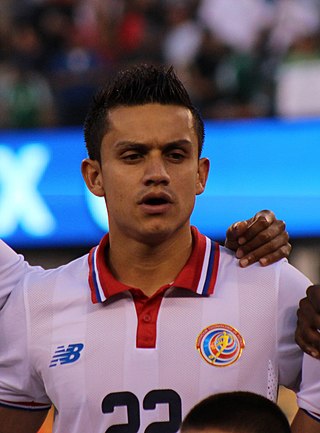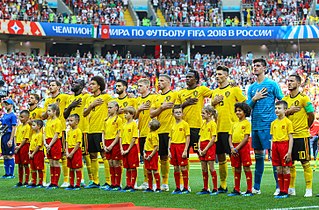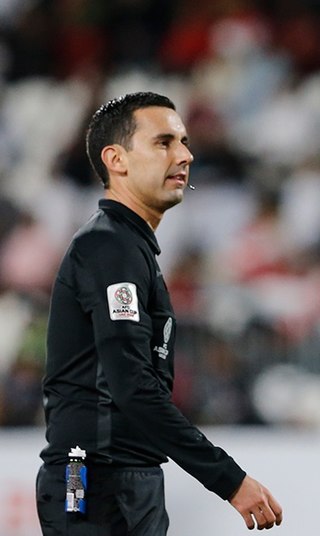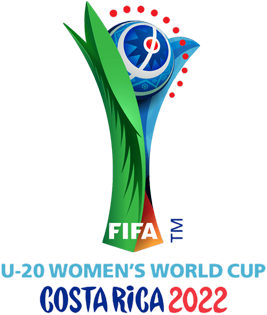Related Research Articles

The 2002 FIFA World Cup, also branded as Korea/Japan 2002, was the 17th FIFA World Cup, the quadrennial football world championship for men's national teams organized by FIFA. It was held from 31 May to 30 June 2002 at sites in South Korea and Japan, with its final match hosted by Japan at International Stadium in Yokohama. During the opening ceremony, the championship was declared opened by President of South Korea Kim Dae-jung.

Nissan Stadium, a.k.a. the International Stadium Yokohama, is a multi-purpose stadium in Yokohama, Kanagawa Prefecture, Japan, which opened in March 1998. It is the home stadium of Yokohama F. Marinos of the J1 League.

Jervis Éarlson Drummond Johnson is a Costa Rican former footballer who played as a right-back.
Roy Anthony Myers Francis is a Costa Rican former football player who played most of his career with Deportivo Saprissa.

Gabriel Badilla Segura was a Costa Rican footballer who played as a defender.

The 2000 FIFA Club World Championship was the inaugural FIFA Club World Cup, the world club championship for men's club association football teams. It took place in Brazil from 5 to 14 January 2000. FIFA as football's international governing body selected Brazil as the host nation on 8 June 1999 as the bid was found to be the strongest among four candidates. The draw was made at the Copacabana Palace in Rio de Janeiro on 14 October 1999. All matches were played in either Rio de Janeiro's Estádio do Maracanã or São Paulo's Estádio do Morumbi.
Group G of the 2002 FIFA World Cup took place on 13 June 2002. Mexico won the group, and advanced to the second round, along with Italy. Croatia and Ecuador failed to advance.
Group H of the 2002 FIFA World Cup took place from 4 June 2002 to 14 June 2002. Japan won the group and advanced to the round of 16, along with Belgium. Russia and Tunisia failed to advance.
The 2002 season was the 80th season of competitive football in Ecuador.
The Costa Rica national under-20 football team represents Costa Rica in international football at this age level and is controlled by the Costa Rican Football Federation.

Shirley Cruz Traña is a retired Costa Rican professional footballer who last played as a midfielder for Alajuelense of the Costa Rican Women's Premier Division and the Costa Rica women's national football team. A creative midfielder who often acts as a deep-lying playmaker, Cruz is the second-ever female footballer behind Gabriela Trujillo from Costa Rica to play in Europe when she joined Lyon in 2005.

José Miguel Cubero Loría is a Costa Rican professional footballer who plays as a midfielder for Liga de Ascenso club Sarchí.

Belgium have appeared in the finals tournament of the FIFA World Cup on 14 occasions, the first being at the first FIFA World Cup in 1930 where they finished in 11th place and played the first ever World Cup match against the United States. The inaugural FIFA World Cup final was officiated by Belgian referee John Langenus.

César Arturo Ramos Palazuelos is a Mexican professional football referee. His mother was born in France and his father is of Portuguese descent. Both his parents emigrated to Mexico a year before he was born. He has been a full international for FIFA since 2014. He refereed matches in the CONCACAF Champions League, the 2018 FIFA World Cup the 2019 AFC Asian Cup, the 2022 FIFA World Cup, and in the 2024 Copa América.

On 16 June 2001, Mexico played Costa Rica in a football match at the Estadio Azteca in Mexico City, Mexico on the fourth matchday of the final round in the qualification process for the 2002 FIFA World Cup.
For the 2002 FIFA World Cup qualification, there were two inter-confederation play-offs to determine the final two qualification spots to the 2002 FIFA World Cup. They were won by Ireland and Uruguay. The matches were played between 10 and 25 November 2001. As of 2022, this remains the last time a European team earned a World Cup spot through an intercontinental play-off. From 2006 onwards, the remaining European qualifiers would be determined by continental play-offs.
The 2002 FIFA World Cup UEFA–AFC qualification play-off was a two-legged home-and-away tie between a group runner-up of the European qualifying tournament, the Republic of Ireland, and the winners of the AFC play-off, Iran. The games were played on 10 November and 15 November 2001 in Dublin and Tehran, respectively.

The 2022 FIFA U-20 Women's World Cup was the 10th edition of the FIFA U-20 Women's World Cup, the biennial international women's youth football championship contested by the under-20 national teams of the member associations of FIFA, since its inception in 2002 as the FIFA U-19 Women's World Championship. The tournament was held in Costa Rica, which would have hosted the 2020 edition before it was cancelled due to the COVID-19 pandemic. It was the second time that Costa Rica hosted a FIFA tournament after the 2014 FIFA U-17 Women's World Cup.

The United States versus Costa Rica football (soccer) match was held on 22 March 2013 at the Dick's Sporting Goods Park in Commerce City, Colorado. It was part of the second matchday of the final qualification round in CONCACAF for the 2014 FIFA World Cup.
The 2022 FIFA World Cup qualification CONCACAF–OFC play-off was a single-leg match between the fourth-placed team of the CONCACAF qualification third round, Costa Rica, and the winners from the OFC qualification, New Zealand. Before their identity was known, the winners of the play-off had already been allocated to Group E at the World Cup.
References
- ↑ "Mattus irá al Mundial". La Nación (in Spanish). 8 January 2002. Retrieved 3 June 2022.
- ↑ Jiménez, Daniel (19 May 2022). "Ningún árbitro tico dirigirá un partido en Catar 2022". Teletica. Retrieved 3 June 2022.
- William Mattus – referee profile at WorldFootball.net
- William Mattus – referee profile at Weltfussball.de (in German)
